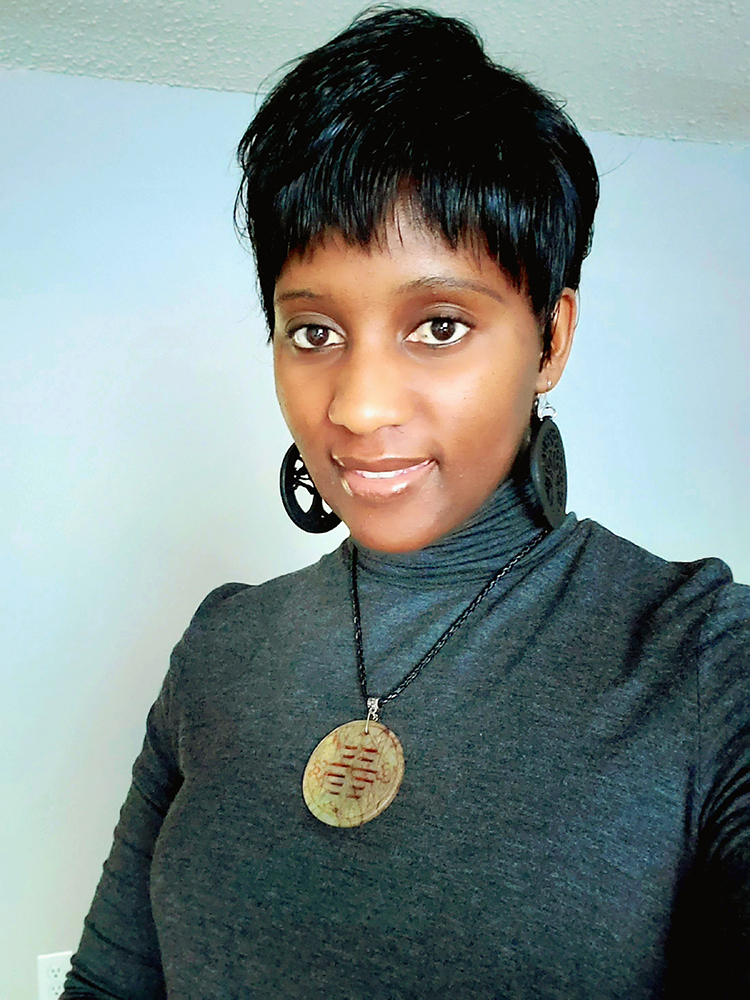 Dr. A. Brenda Kapingidza, a 2015 graduate of Lander University, is working as a postdoctoral associate at the Duke Human Vaccine Institute (DHVI), a world leader in cutting edge vaccine research against infectious diseases such as HIV-1, influenza, tuberculosis, Zika, COVID-19, and others.
Dr. A. Brenda Kapingidza, a 2015 graduate of Lander University, is working as a postdoctoral associate at the Duke Human Vaccine Institute (DHVI), a world leader in cutting edge vaccine research against infectious diseases such as HIV-1, influenza, tuberculosis, Zika, COVID-19, and others.
A member of Dr. Mihai Azoitei's protein engineering team, Kapingidza's research is focused on two areas critical for the development of a vaccine against SARS-CoV-2, the virus that causes COVID-19: designing an immunogen for the induction of broadly neutralizing antibodies, and determining the biophysical properties of immunogens that lead to B cell activation and development for antibody secretion.
Because new strains of SARS-CoV-2 have already appeared, as the virus has propagated and adapted to the human body, and because coronaviruses similar to SARS-CoV-2 are likely to spill into humans from animals in the future, researchers at Duke are attempting to develop a vaccine that will neutralize not only SARS-CoV-2, but all coronaviruses.
Estimates of how long that might take have ranged from a year to a year and a half - or longer. "We don't know," Kapingidza said. "That's the short answer to the question."
Some good news is that DHVI has been given approval to launch a Phase 1 clinical trial of one of its most promising antibody treatments for COVID-19. While only a stopgap measure, and not the vaccine that is being sought, researchers hope the treatment, if it is approved for use, would temporarily block the virus from infecting people, or reduce the severity of its symptoms.
A native of Zimbabwe, Kapingidza came to Lander through the Dr. Douglas and Mrs. Jean Mufuka Scholars Program. Her scholarship, she said, was life-changing, creating opportunities she "never thought possible."
She had a personal stake in learning about disease.
"I grew up in South Saharan Africa, where HIV and AIDS is a big problem. I really wanted to understand how a disease is able to attack the immune system the way it does, and what we can do to develop a vaccine or cure for AIDS," she said.
After graduating from Lander with honors in chemistry and a minor in mathematics, Kapingidza did graduate work at Washington State University, then enrolled in the Ph.D. program in biochemistry at the University of South Carolina, where she studied the interactions of the human immune system with different allergens in the quest to develop better immunotherapy for allergic diseases like asthma, atopic dermatitis and rhinitis.
She is an expert in protein expression and purification, antibody fragments expression and purification, molecular DNA cloning, and X-ray crystallography, and the author of eight papers, with one of the latest featured on the cover of the November, 2019 issue of "Journal of Immunology."
To design immunogens to fight COVID-19, HIV and other pathogens, Kapingidza and her fellow scientists in the Azoitei lab are utilizing some powerful tools: state of the art computational protein design algorithms using Rosetta software and high-throughput library screening on the surfaces of yeast and mammalian cells.
"These techniques allow us to model with high confidence the atomic details of protein structures like that of SARS-CoV-2 and predict protein-protein interactions between SARS-CoV-2 immunogens and the receptor that SARS-CoV-2 employs to gain entry inside the human cell. Rosetta provides an experimental platform to rapidly screen millions of immunogen candidates, thereby making it possible to predict what future coronaviruses may look like and how they can interact with the human immune system. This knowledge is fundamental in designing a robust and effective vaccine that can combat all future coronavirus outbreaks," she said.